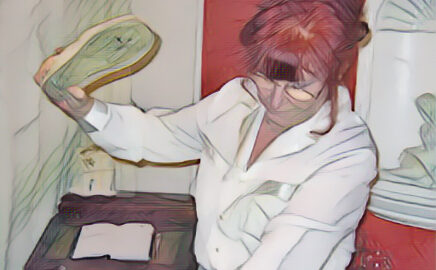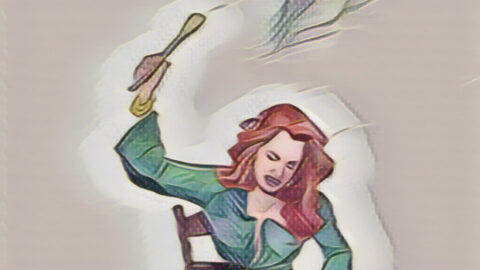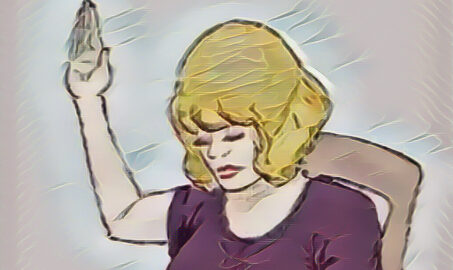(gap: 2s) Growing up in a small English town in the 1960s was like living in a sepia-tinted photograph—everything seemed slower, quieter, and somehow more serious. The air always carried a faint tang of coal smoke and cut grass, and the streets were lined with neat rows of Morris Minors and bicycles, their metal frames glinting in the pale sunlight. On summer afternoons, the distant sound of the Beatles drifted from open windows, mingling with the laughter of children and the occasional bark of a neighbor’s dog. My world was small: a modest brick house with a garden where the shadows grew long in the late afternoon, and a mother who, after losing my father when I was just three, seemed to carry the weight of the world on her narrow shoulders.
My mother was a woman transformed by grief and faith. She clung to her Christian beliefs with a kind of desperate hope, and I was swept along in her devotion. Church and scripture became the backbone of our lives, a routine as predictable as the ticking of the clock in our hallway. I remember the way she would smooth my hair and straighten my collar before we left for Sunday school, her hands gentle but her eyes always searching, as if she was looking for some sign that she was doing things right.
Sundays had a rhythm all their own. The morning would begin with the scent of toast and marmalade, the kitchen filled with the clatter of crockery and the low hum of the radio. I was sent off to Sunday school, which, truth be told, I rather enjoyed. The teachers there seemed to have endless patience, their voices soft as they told stories of lions and miracles. There were songs to sing, games to play, and a sense of warmth that was often missing from the rest of the week. I can still recall the feel of the wooden chairs beneath my legs, the dust motes dancing in the shafts of sunlight, and the way my laughter seemed to echo in the high-ceilinged room.
But after Sunday school, the mood would shift. My mother would take my hand, her grip firm, and we’d walk together to the church. The building itself was imposing—cold stone walls, stained glass windows that cast colored patterns on the floor, and the heavy scent of incense that clung to my clothes long after we left. I dreaded those services. The pews were hard and unforgiving, and the sermons seemed to stretch on forever. I could never sit still, my legs swinging restlessly as I tried to stifle yawns and fidgets. I always seemed to embarrass my mother, who took such pride in making sure I looked presentable, even when money was tight. She would shoot me warning glances if I whispered or made faces, her lips pressed into a thin line.
The consequences for my misbehavior were as predictable as the church bells. One wrong move—a giggle, a wriggle, a whispered joke—and I’d feel my mother’s hand tighten around mine as we left early, her silence heavy with disappointment. The walk home always felt longer on those days, the sound of my shoes scuffing the pavement echoing in my ears. At home, the punishment was swift: a smack on the bottom, then banishment to my bedroom. I’d sit on my bed, staring at the faded wallpaper, listening to the muffled sounds of the world outside, feeling the sting of both the smack and my mother’s disapproval. The hours stretched endlessly, broken only by the distant chime of the clock and the occasional creak of floorboards.
In the early years, my mother’s discipline was straightforward. She would take me over her knee, my small body draped awkwardly across her lap, the familiar scent of her dress and the faint tremor in her hands betraying her own nerves. Her hand would come down with a sharp, stinging precision—what she called ‘six of the best.’ The first smack always startled me, a sudden heat blooming across my skin, followed by a prickling ache that seemed to radiate outward. I’d bite my lip, determined not to cry, but the pain would build with each strike, until my resolve crumbled and the tears spilled over. The sound of her hand meeting flesh echoed in the small room, mingling with my muffled sobs. There was a strange intimacy to it—a ritual of sorts, both of us locked in a dance of discipline and remorse. When it was over, she would hold me for a moment, her arms tight, her own breathing ragged, before sending me to my room to reflect on my sins.
As I grew older, though, her hand seemed to lose its power. I was taller, stronger, and the sting of her palm no longer carried the same weight. That was when the slipper made its first appearance. It was an ordinary house slipper, soft and worn at the toe, but in my memory it looms large—a symbol of authority, always close at hand, tucked behind a door or under the bed. The first time she used it, I remember the cold dread that settled in my stomach as she fetched it, her face set in grim determination. The slipper’s smack was sharper, more humiliating, the rubber sole leaving a hot, tingling welt that lingered long after the punishment ended. The sound was different, too—a flat, echoing slap that seemed to fill the whole house. I learned to dread the sound of her footsteps on the stairs, the pause before the door creaked open, the sight of the slipper in her hand. Each spanking was a storm: the rush of fear, the sting of impact, the flood of tears, and finally, the quiet after, when I was left alone with my shame and the throbbing heat on my skin.
But even the slipper lost its edge eventually. I became bolder, more defiant, testing the boundaries with a stubbornness that I now realize must have driven my mother to despair. After one particularly trying Sunday—when I’d fidgeted and whispered through the entire service, earning more than a few glares from the congregation—she confided in a fellow church member, her voice low and desperate. Soon after, a new instrument of discipline appeared in our home: the cane.



























































